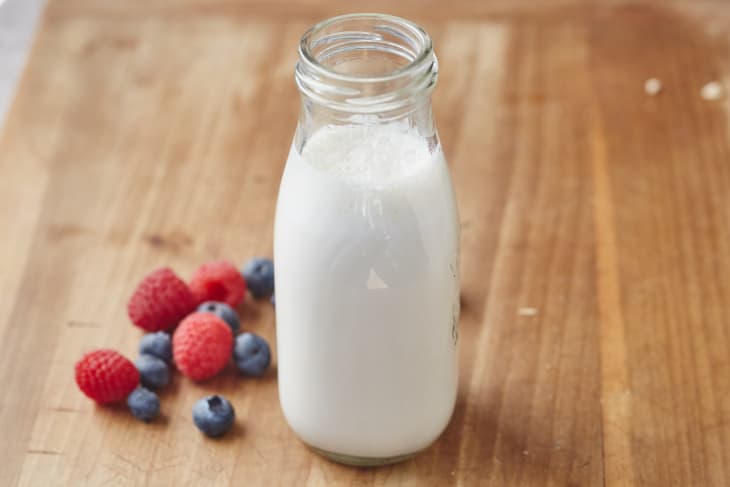Why I Stopped Drinking Almond Milk & Went Back to Regular Milk Instead
I’ve never been a big milk drinker, but I pour it over cereal or granola, add a splash to black tea, and order the occasional cappuccino. Several years ago I discovered almond milk, and making the switch from cow’s milk to non-dairy milk felt like a no-brainer. It seemed like everyone around me was giving up dairy for health reasons, and since I wasn’t particularly attached to milk I joined in.
But then I learned a little more — and stopped drinking alternative milks altogether. Here’s why I made the switch back to cow’s milk.
1. I’m not lactose intolerant or allergic to milk.
One of the reasons I initially switched to non-dairy milk was because I learned about the prevalence of lactose intolerance: 65 percent of human population has trouble digesting lactose, the sugar found in milk. For people of East Asian descent like me, that statistic is even more significant: Up to 90 percent of the population is lactose intolerant, and even those who aren’t lactose intolerant as a child can develop an intolerance as an adult. Those numbers seemed so high, I was pretty sure I had to have some kind of intolerance.
And yet I have never had a single symptom of lactose intolerance. Drinking a milkshake has never given me gas, abdominal cramps, or any signs of gastrointestinal distress. And I’m definitely not allergic to casein, the protein in milk, which would manifest itself as an immune reaction after drinking milk. As far as I can tell, I digest dairy just fine.
2. I try to stay away from processed foods.
I don’t follow a special diet or adhere to any particular eating philosophy except one: I make sure most of what I eat every day is unprocessed food. That means I cook from scratch and read labels carefully, but also indulge in the occasional treat. The key word here is occasional. I believe you can eat anything you want, as long as you eat it in moderation; it’s the foods you eat on a daily basis that you need to keep an eye on.
But almost every day I was consuming an industrially processed food with one especially concerning additive: carrageenan.
Carrageenan is an additive derived from seaweed and is used as a stabilizer and thickener. Although it is considered safe by the FDA, some scientists have raised questions about the potentially harmful effects of widespread carrageenan consumption. (You can read a review of the research, published in 2001, here.)
The FDA denied a petition to re-examine the safety of carrageenan and it is still an approved ingredient in organic products, but many companies have reformulated their products to cut out the additive.
Until I had this realization, I had felt so virtuous every time I passed by the milk case at the grocery store and stocked my shopping cart with organic almond milk instead. After, those cartons stuck out like a sore thumb in my basket of fruits, vegetables, meats, and whole grains.
3. I’ve learned how to pick out quality milk.
Of course, not all milk is created equal. I don’t consider cheap milk from sad cows on industrial farms the better alternative. Instead, I seek out the best-quality milk I can find, from local sources when possible. This means milk that is considerably more expensive than the stuff I can buy from the convenience store around the corner, but as with meat and eggs, I think what that extra money buys — better animal welfare, fewer pesticides, support for a more sustainable food system — is worth it.
I don’t consume all that much milk, and I don’t think I ever will. But I’m also not lactose intolerant, allergic to milk, or vegan, so a small amount of good-quality milk every day is the choice that works best for me. And in dairy-hating, health-obsessed Los Angeles, it’s one that feels almost rebellious!
How about you? What kind of milk do you drink and what are the factors that informed your decision?
